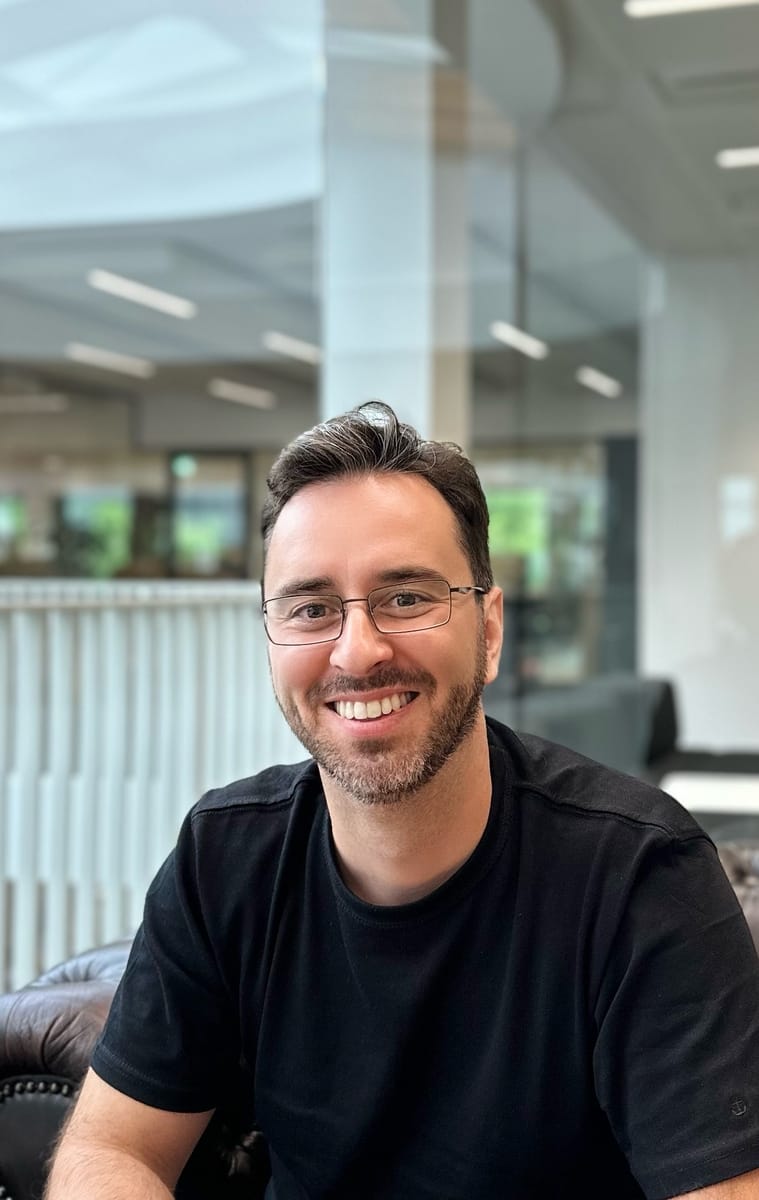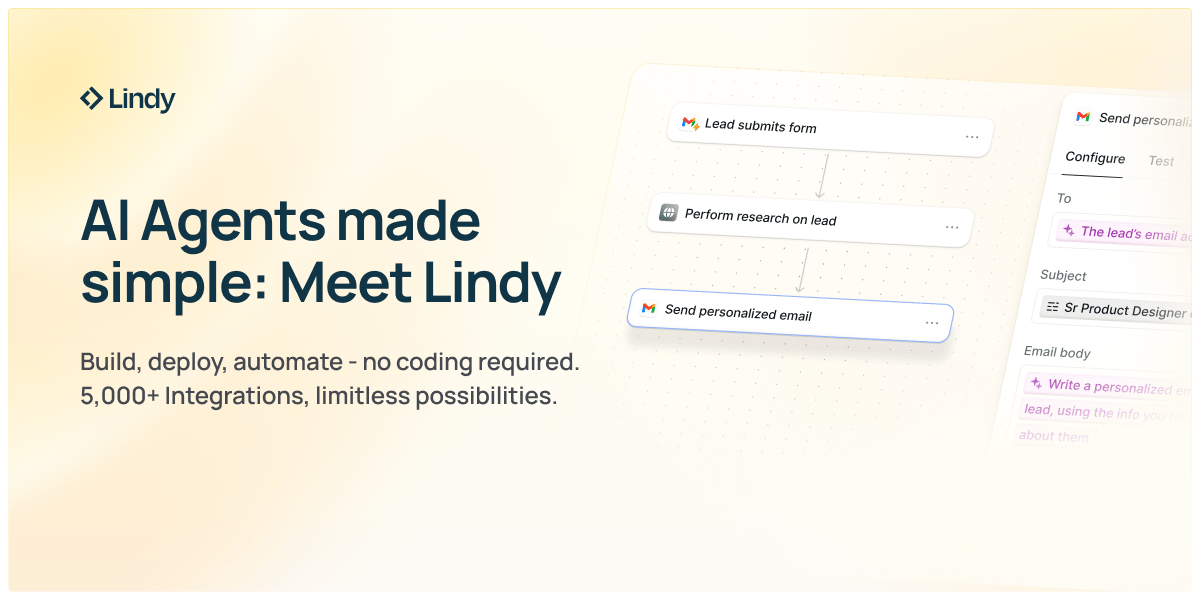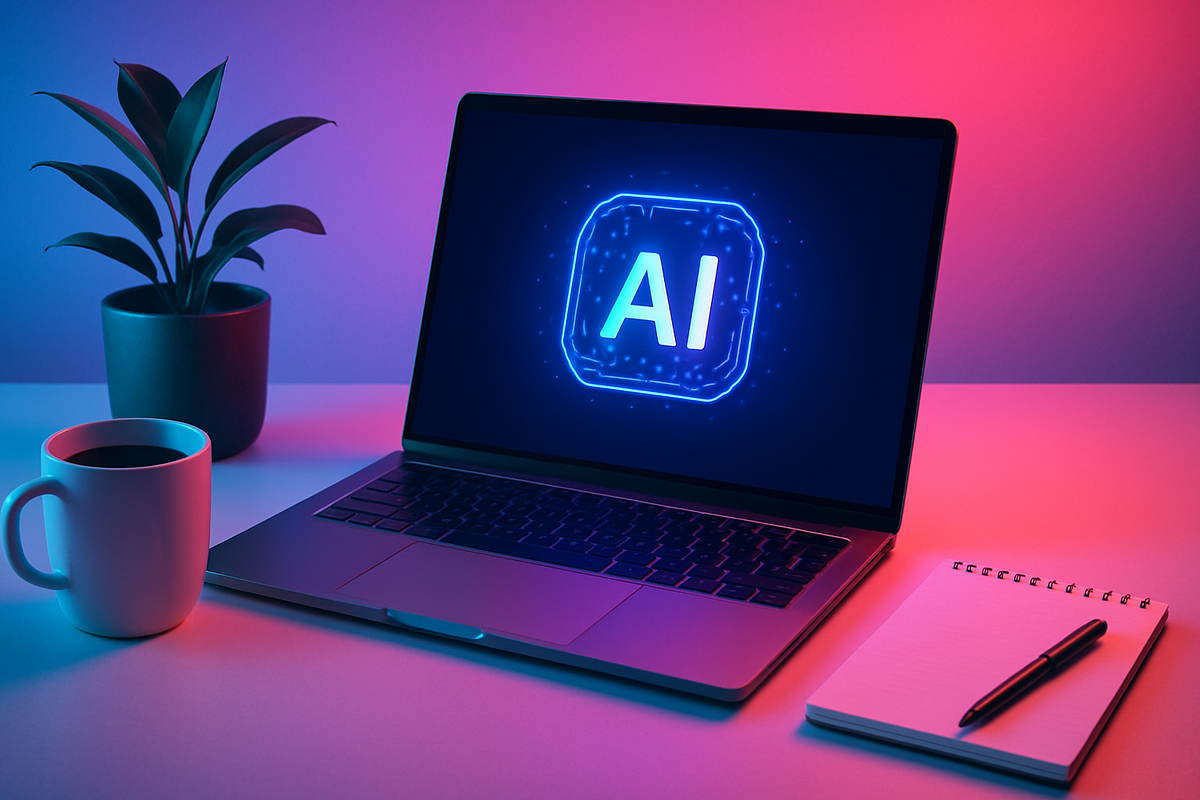The Simplest Way To Create and Launch AI Agents
Imagine if ChatGPT and Zapier had a baby. It’d be ridiculously smart… and probably named Lindy.
With Lindy, you can spin up AI agents in minutes to handle all the stuff you’d rather not—like lead qual, cold outreach, web scraping, and other “ugh” tasks. It’s like hiring a whole team that never sleeps, never complains, and never asks for PTO.
Lindy’s agents are ready to take on support tickets, data entry, lead enrichment, scheduling, and more. All so you can get back to the fun part: building your business.
Ready to hand off the busy work? Build your first AI agent today and join thousands of businesses already saving time (and sanity) with automation that actually works.
Founders spend weeks perfecting pitch decks before talking to investors, while successful startups launch with half-ready products. The secret isn't eliminating procrastination—it's channeling fear into strategic action. Companies that master "productive procrastination" outperform perfectionist competitors in terms of time to market.
Founders love speed until fear sets in. Then selecting a CRM turns into a two-week ordeal, and logo redesigns take up entire afternoons. This isn't laziness—it's productive procrastination, where founders swap out important but uncomfortable tasks for busy work that feels like progress.
Startup failures are caused by internal paralysis rather than market conditions. The pattern repeats endlessly: instead of talking to customers, founders perfect landing pages. Instead of shipping features, they reorganize project management tools. Instead of pitching investors, they obsess over deck typography.
Hi, I'm Dr. Hernani Costa, founder of First AI Movers Daily Newsletter, where I assist decision-makers in navigating AI transformation through my newsletter, reaching over 4,000 professionals. After consulting with numerous businesses, I've observed that how founders handle uncertainty shapes their success. The companies that succeed don't eliminate fear—they turn it into a strategic advantage.
The most successful founders I work with have learned to recognize when they're avoiding discomfort through "productive" tasks. They understand that startups reward action over preparation, and market validation beats internal perfection. The difference isn't courage—it's about developing systems that convert productive procrastination into genuine strategic thinking while overcoming fear on critical business activities.
What Is Productive Procrastination in Startups?
Productive procrastination occurs when founders substitute essential but challenging business tasks with activities that appear productive but actually hinder progress toward market validation and growth.
This shows predictable patterns. A founder needs to validate product-market fit, but instead spends three days choosing between Notion and Airtable. They should be calling potential customers, but they're redesigning business cards. They need to ship a basic feature, but they're researching the perfect analytics tool.
The psychology behind this behavior comes from what researchers call "uncertainty avoidance." Our brains seek predictability, and startup activities like customer interviews or investor pitches involve high uncertainty and the risk of rejection. Logo design and tool selection seem safer because effort leads to visible results.
I've gone through this process many times myself. Last year, I spent two weeks perfecting an automation workflow instead of reaching out to potential readers of First AI Movers. The workflow looked impressive, but it didn't produce any results, not even a single feedback loop. I've noticed a pattern: when I'm afraid of rejection, I tend to find complicated ways to keep busy, avoiding the uncertainty. And, I believe I’m not alone!
The danger compounds because these activities aren't obviously wasteful. Choosing good tools matters. Well-designed pitch decks help. But when these become primary activities while customer development gets postponed, founders create what I call "preparation debt"—impressive internal systems with no market validation.
Why Do Founders Choose Safe Work Over Critical Tasks?
Founders default to safe work because it provides immediate psychological rewards without risking the ego damage that comes from market rejection or customer indifference.
The pattern arises from two psychological drivers.
First, "effort justification"—when founders spend time on an activity, they feel accomplished regardless of its impact on the business. For example, spending six hours redesigning a landing page brings satisfaction, even if no customers see the changes.
Second, "control illusion"—internal activities seem manageable, while external validation appears chaotic. You can control whether your pitch deck looks professional, but not investor interest. This leads to a bias toward activities with predictable results.
Most founder anxieties are easier to handle than people expect. The fear of customer rejection almost never causes serious problems, but the psychological pain feels intense in the moment. As a result, founders often unconsciously pick activities that help them avoid this discomfort.
The most dangerous version happens during AI transformation. Companies spend months evaluating AI tools instead of running experiments. They build comprehensive AI strategies before understanding what works for their specific use case, as I wrote in my previous analysis of why teams lose productivity with ChatGPT, the companies that win start with messy experiments, not perfect plans.
The irony is that safe work often creates more long-term stress. Founders who delay customer conversations end up with products nobody wants. Those who postpone difficult hiring decisions build teams that can't execute. The temporary comfort of avoiding uncertainty leads to much larger problems later.
How Does Fear of Uncertainty Drive Startup Delays?
Fear of uncertainty causes a common founder reaction: replacing uncontrollable tasks (customer validation) with controllable ones (internal optimization), which leads to dangerous delays while still giving the false impression of progress.
Uncertainty acts like psychological kryptonite for most founders. When facing unclear outcomes, will customers want this feature? Will investors like our traction?—the brain triggers stress responses that make avoidance seem logical. Instead of pushing through discomfort, founders unconsciously shift energy toward tasks with more predictable results.
This manifests in several specific ways:
Research rabbit holes: Spending weeks analyzing competitor pricing instead of testing your own
Tool optimization: Perfecting workflows that serve no customers
Preparation theater: Building elaborate plans for situations that may never occur
The most successful founders I've worked with recognize these patterns and develop what I call "discomfort tolerance." They've learned that uncertainty signals opportunity, not threat. When something feels scary and important, that's usually where breakthrough growth happens.
The AI transformation context makes this even more critical. Companies can spend six months building AI strategies while competitors implement imperfect but functional solutions. In my experience helping organizations become AI-first, the winners start with quick experiments—even if they fail—rather than comprehensive plans.
The key insight: uncertainty isn't a problem to solve but a condition to navigate. Startups exist in permanent uncertainty. Founders who wait for clarity miss opportunities, while those who act despite uncertainty capture market position.
When Does Productive Procrastination Actually Help Startups?
Strategic procrastination is useful when founders delay to gain genuine insights instead of avoiding fear, letting their subconscious work to find breakthrough solutions to complex problems.
Not all delay is harmful. Taking a break from tough problems after initial work often results in better solutions. The brain keeps working in the background, producing insights that wouldn't come through forced effort.
The difference is in the starting point. Constructive procrastination involves first grappling with the problem. You can't gain from mental incubation without giving your subconscious something to work on. Founders who immediately dodge tough decisions with busy work miss this benefit entirely.
Here's how strategic delay works in practice:
Deeply engage with a strategic challenge for focused time.
Document your thinking, questions, and initial approaches.
Deliberately take breaks at designated intervals.
Return with a fresh perspective at scheduled times.
I've seen this work powerfully in AI implementation planning. Founders who spend intensive time understanding their automation opportunities, then step away for a few days, often return with clearer priorities than those who force immediate decisions.
The key difference: strategic procrastination feels uncomfortable because you're not working, while fear-based procrastination feels productive because you're busy with tasks. One leads to insights; the other creates elaborate avoidance systems.
Last month, I struggled with First AI Movers’ positioning against other newsletters. After two days of forced brainstorming, I deliberately stopped thinking about it. Three days later, while running, the solution became clear: prioritize implementation over theory. The breakthrough came from strategic delay, not forced effort.
What Simple Actions Beat Analysis Paralysis?
Replace perfectionism with "good enough" standards, set clear decision deadlines, and focus on customer-facing activities instead of internal optimization to keep startup momentum going.
The most effective approach combines systematic decision-making with forcing functions that prevent endless analysis. Successful founders develop frameworks that strike a balance between thorough thinking and action bias.
The 2-Minute Rule: If a task takes less than two minutes, do it immediately. For larger tasks, commit to just two minutes of work. Starting breaks psychological resistance, and momentum usually continues beyond the initial commitment.
Time-boxed decisions: Set maximum timeframes for different decision types—two days for operational choices, one week for strategic ones. When time expires, make the best decision with available information. Perfect information rarely exists in startups.
Good enough thresholds: Define minimum acceptable standards before beginning tasks. For pitch decks, "clear message with professional formatting" beats "perfect design with custom graphics." For product features, "works reliably" beats "handles every edge case."
Customer-first prioritization: When torn between internal optimization and customer-facing activities, always choose customer activities. Improving your CRM can wait; understanding customer problems cannot.
The 5-second rule: When feeling urges to procrastinate, count down 5-4-3-2-1 and immediately take action. This bypasses the brain's rationalization mechanisms that create elaborate excuses.
My practical experience: For First AI Movers, I set a rule that newsletter content gets a maximum of one hour of editing. After that, it ships regardless of minor imperfections. This maintains quality while preventing perfectionist paralysis that delayed previous publications.
How Can AI-First Companies Avoid Decision Paralysis?
AI transformation demands balancing strategic planning with quick experimentation—companies need to test tools rapidly while developing systematic methods to prevent both haphazard tool adoption and analysis paralysis.
AI-first transformation presents unique decision challenges. The technology landscape shifts monthly, making thorough planning seem both essential and unattainable. Founders face decision fatigue with thousands of AI tools, each claiming to deliver breakthrough productivity improvements.
The solution focuses on structured experimentation instead of perfect planning. Begin with specific use cases, quickly test tools, and expand what works. This requires being comfortable with imperfect choices and being ready to abandon tools that don't provide value.
From my field experience, successful AI transformation follows this pattern:
Identify one specific repetitive task (customer support, content creation)
Test 2-3 tools for two weeks maximum
Pick the best performer and implement it fully before expanding
Document what works for systematic scaling
Companies that struggle often spend months evaluating comprehensive AI platforms instead of addressing specific problems. They develop detailed AI strategies before understanding what works best in their particular situation. Meanwhile, competitors deploy imperfect solutions and refine them based on results.
The key insight: AI adoption rewards speed over comprehensiveness. The tools evolve so quickly that perfect planning becomes obsolete before implementation. Better to implement good-enough solutions quickly and improve iteratively.
As I discussed in my analysis of AI audit frameworks, successful organizations focus on measurable outcomes rather than perfect processes. They upskill people while testing tools, creating adaptive capability rather than rigid systems.
My Final Thoughts
The founders who succeed at scale don't eliminate productive procrastination—they redirect it into a strategic advantage by distinguishing between fear-driven delays and genuine strategic thinking. After helping dozens of companies navigate growth challenges, the pattern is clear across every successful startup I've worked with: they move quickly on customer-facing tasks while being deliberate about internal decisions. They launch imperfect products, refine them based on feedback, and only optimize what customers actually use.
The urgency is real. In today's competitive environment, delays can add up quickly. While you're refining your pitch deck, competitors are already reaching out to customers. While you're selecting the ideal tool stack, others are solving real problems with less-than-perfect solutions.
My practical framework when facing any business decision: ask yourself, "Am I avoiding this because it's genuinely complex, or because I'm scared of the outcome?" Complex decisions deserve strategic thinking. Scary decisions require immediate action.
The most successful founders develop what I call "selective perfectionism"—being strict about quality in customer-facing areas like product reliability, customer service, and market positioning, but okay with "good enough" in other areas like internal tools, processes, and documentation. This isn't about being careless; it's about focusing perfectionist effort on areas that deliver customer value rather than on things that just make founders comfortable.
Companies adopting this method experience clear benefits: faster time-to-market compared to perfectionist competitors, increased customer satisfaction through rapid iteration cycles, greater investor interest from proven market validation, and reduced stress levels by confronting uncertainty directly instead of avoiding it.
Startups fail not because of imperfect execution, but because of perfect preparation that never results in market action. Founders who create sustainable businesses learn to dance with uncertainty instead of avoiding it, using discomfort as a guide toward meaningful work. When something feels scary and important, that's usually where the breakthrough opportunities are.
Stop perfecting your logo while customers wait. Start those difficult conversations. Ship that imperfect feature. The market will show you what matters—but only if you're brave enough to listen.
— by Dr. Hernani Costa at First AI Movers | Join the conversation on LinkedIn.
"Unlock your daily 5-Minute AI Edge - Subscribe for proven playbooks. Ready for results? Book a call with Dr. Hernani Costa Today!"





